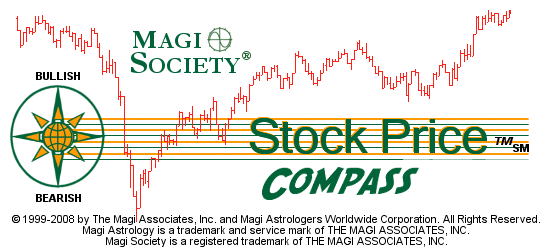
Fibonacci and Astro Fibonacci Ratios

|
Above is a one-year chart of the S&P 500 displaying both standard Fibonacci and Astro Fibonacci retracement ratios. Both types of Fibonacci ratios are calculated using the all time high made in October of 2007 and the low made in March of 2009.
The standard Fibonacci retracement levels are represented by the red lines going horizontally accross the whole chart. The Astro Fibonacci ratio levels are marked by the blue lines which are also drawn horizontally accross the whole width of the chart. There are nineteen primary and secondary Astro Fibonacci ratios; inside the right hand margin of the chart, we have labeled ten of these ratios. Please examine the above chart, and notice how the stock market "gravitates" to all 19 Astro Fibonacci ratios . Please note that almost always, as the market zigzags, the lows and highs are formed close to one of the 19 Astro Fibonacci levels. It means Astro Fiboancci works and that is the reason standard Fibonacci works. In most cases, Astro Fibonacci is more precise than standard Fibonacci. For example, you can see that the Ceres/Jup ratio of 38.8% was more accurate at forecasting support and resistance than the 38.2% standard Fibonacci ratio. In the chart above, the Ceres/Jup line looks like it is twice as thick as the other blue lines but that is because there are actually two lines there - besides the Ceres/Jup ratio of 38.8% there is also a blue line representing the 39.0% Mercury/Venus ratio. Because these two Astro Fiboancci ratios are nearly exactly the same, they have the combined power of twice the force of any single Astro Fibonacci ratio. These two Astro Fibonacci ratios are what makes the 38.2% standard Fibonacci ratio work. The chart below is drawn with the Astro Fibonacci ratios reversed. Sometimes, the reversed ratios are also very helpful indicators of natural support and resistance. |
|
Above is a one-year chart of the S&P 500 displaying both standard Fibonacci and Astro Fibonacci retracement ratios. Both types of Fibonacci ratios are calculated using the all time high made in October of 2007 and the low made in March of 2009.
The standard Fibonacci retracement levels are represented by the red lines going horizontally accross the whole chart. The Astro Fibonacci ratio levels are marked by the blue lines which are also drawn horizontally accross the whole width of the chart. There are nineteen primary and secondary Astro Fibonacci ratios; inside the right hand margin of the chart, we have labeled ten of these ratios. Please examine the above chart, and notice how the stock market "gravitates" to all 19 Astro Fibonacci ratios . Please note that almost always, as the market zigzags, the lows and highs are formed close to one of the 19 Astro Fibonacci levels. It means Astro Fiboancci works and that is the reason standard Fibonacci works. In most cases, Astro Fibonacci is more precise than standard Fibonacci. For example, you can see that the Ceres/Jup ratio of 38.8% was more accurate at forecasting support and resistance than the 38.2% standard Fibonacci ratio. In the chart above, the Ceres/Jup line looks like it is twice as thick as the other blue lines but that is because there are actually two lines there - besides the Ceres/Jup ratio of 38.8% there is also a blue line representing the 39.0% Mercury/Venus ratio. Because these two Astro Fiboancci ratios are nearly exactly the same, they have the combined power of twice the force of any single Astro Fibonacci ratio. These two Astro Fibonacci ratios are what makes the 38.2% standard Fibonacci ratio work. The chart below is drawn with the Astro Fibonacci ratios reversed. Sometimes, the reversed ratios are also very helpful indicators of natural support and resistance. |
© 2009 by The Magi Associates, Inc. All Rights Reserved.
Magi Astrology is a trademark and service mark of THE MAGI ASSOCIATES, INC.
Magi Society is a registered trademark of THE MAGI ASSOCIATES, INC.
IMPORTANT DISCLAIMER: By reading any of the material on this website you agree to our DISCLAIMER:
The Magi Society and The Magi Associates, Inc. make no claims whatsoever concerning the validity
of the information provided herein, and will not be held liable for any use thereof. No information
or opinion expressed here is a solicitation to buy or sell securities, bonds, real estate, commodities,
options, futures or any financial instruments whatsoever.